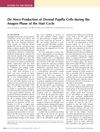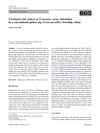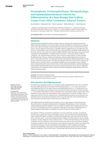 6 citations,
July 2016 in “Gynecological Endocrinology”
6 citations,
July 2016 in “Gynecological Endocrinology” PSA levels are higher in women with PCOS, but FAI is a more accurate marker for diagnosis.
 1 citations,
May 2013 in “Journal of the Egyptian Women's Dermatologic Society (Print)”
1 citations,
May 2013 in “Journal of the Egyptian Women's Dermatologic Society (Print)” PSA could be a marker for hyperandrogenism in women, but more research is needed.
 February 2017 in “Cancer Causes & Control”
February 2017 in “Cancer Causes & Control” Swedish men with the E213 A-allele of the androgen receptor have a lower risk of prostate cancer.
 41 citations,
June 2010 in “Journal of Investigative Dermatology”
41 citations,
June 2010 in “Journal of Investigative Dermatology” New cells are added to the hair's dermal papilla during the active growth phase.
 25 citations,
June 2004 in “Journal of Investigative Dermatology”
25 citations,
June 2004 in “Journal of Investigative Dermatology” Macrophage-stimulating protein helps hair grow and can start hair growth phase in mice and human hair samples.
 16 citations,
April 2007 in “Journal of Obstetrics and Gynaecology Research”
16 citations,
April 2007 in “Journal of Obstetrics and Gynaecology Research” Prostate-specific antigen may be a new marker for excess male hormones in women with polycystic ovary syndrome.
 9 citations,
September 2014 in “Cancer Epidemiology, Biomarkers & Prevention”
9 citations,
September 2014 in “Cancer Epidemiology, Biomarkers & Prevention” Certain genetic variants in the androgen receptor are linked to higher PSA levels, potentially affecting prostate cancer screening outcomes.
 7 citations,
November 2013 in “Pediatrics in Review”
7 citations,
November 2013 in “Pediatrics in Review” Acne is a chronic skin condition not caused by poor hygiene or diet, and it requires long-term treatment and patient education.
 6 citations,
February 2015 in “Journal of parasitic diseases”
6 citations,
February 2015 in “Journal of parasitic diseases” Ivermectin injections and spray, along with hygiene measures, successfully treated sarcoptic mange in guinea pigs.
 6 citations,
June 2011 in “Journal of The American Academy of Dermatology”
6 citations,
June 2011 in “Journal of The American Academy of Dermatology” Iron deficiency might be linked to hair loss, but more research is needed.
 5 citations,
December 2020 in “Experimental dermatology”
5 citations,
December 2020 in “Experimental dermatology” A specific type of skin cell creates an opening for hair to grow out, and problems with this process can lead to skin conditions.
 5 citations,
August 2020 in “Curēus”
5 citations,
August 2020 in “Curēus” The document concludes that recent studies help tell apart desmoplastic trichoepitheliomas from other skin tumors, but more research is needed for clear differentiation.
 5 citations,
August 2018 in “International Journal of Dermatology”
5 citations,
August 2018 in “International Journal of Dermatology” Men with sleep apnea and low iron levels are more likely to have male-pattern baldness, especially if they have a family history of hair loss.
 2 citations,
January 2014 in “Medical Principles and Practice”
2 citations,
January 2014 in “Medical Principles and Practice” The study suggests that people with rosacea are more likely to have chronic rhinosinusitis.
 1 citations,
October 2020 in “Journal of The American Academy of Dermatology”
1 citations,
October 2020 in “Journal of The American Academy of Dermatology” Balding might help identify men at higher risk for severe COVID-19, but more research is needed.

Wild African goats have genetic adaptations for surviving harsh desert conditions.
 April 2018 in “Journal of Investigative Dermatology”
April 2018 in “Journal of Investigative Dermatology” The keratin network in mouse skin changes during cornification and affects the skin's protective barrier.
 April 2018 in “Journal of Investigative Dermatology”
April 2018 in “Journal of Investigative Dermatology” STIM1 is essential for sweat secretion.
 April 2018 in “Journal of Investigative Dermatology”
April 2018 in “Journal of Investigative Dermatology” Researchers found a substance in chicken egg yolk that helps hair grow.
 April 2018 in “Journal of Investigative Dermatology”
April 2018 in “Journal of Investigative Dermatology” Light can activate hair growth through a pathway from the eyes to hair follicles.
 April 2018 in “Journal of Investigative Dermatology”
April 2018 in “Journal of Investigative Dermatology” People with alopecia areata have higher levels of a heart disease marker in their blood.
 April 2018 in “Journal of Investigative Dermatology”
April 2018 in “Journal of Investigative Dermatology” Sensitive scalp has higher pH, more redness, abnormal sebum, and altered bacterial makeup.
 January 2018 in “International journal of food and nutrition research”
January 2018 in “International journal of food and nutrition research” Intermittent iron and nutritional supplements can help reduce hair loss.

Women with androgenetic alopecia (hair loss) have normal prostate specific antigen levels but higher testosterone levels.
 9 citations,
November 2021 in “Infectious Agents and Cancer”
9 citations,
November 2021 in “Infectious Agents and Cancer” Androgen deprivation therapy doesn't lower the risk of death from COVID-19 in prostate cancer patients.
9 citations,
January 2014 in “Molecular Genetics and Metabolism Reports” The rhg mutation in mice affects the Oat gene, causing hair growth issues and other symptoms.
1 citations,
September 2021 in “Advances in skin & wound care” SARS-CoV-2 might infect and multiply in skin tissue, possibly aiding in its transmission.
 January 2023 in “Springer eBooks”
January 2023 in “Springer eBooks” Hair shedding that lasts over 6 months may need a closer look, but often just reassurance is enough.
 December 2022 in “Journal of Education, Health and Sport”
December 2022 in “Journal of Education, Health and Sport” Covid-19 can cause different types of hair loss, which can affect people's mental and social well-being.
 January 2015 in “Springer eBooks”
January 2015 in “Springer eBooks” Hair shedding that lasts more than 6 months may need medical tests, but often just reassurance is enough.




























